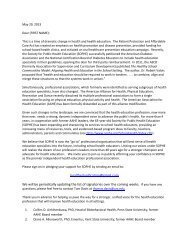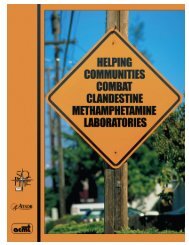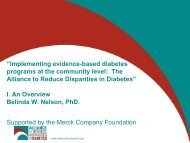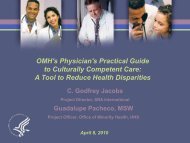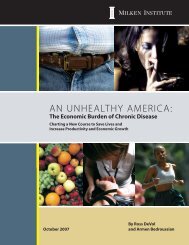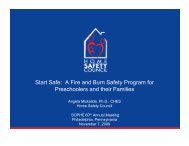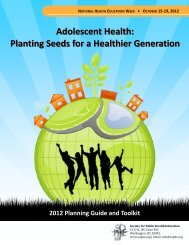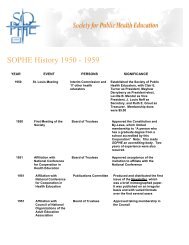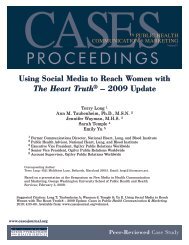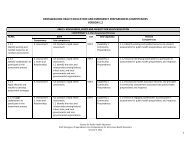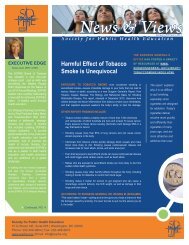to view the program - Society for Public Health Education
to view the program - Society for Public Health Education
to view the program - Society for Public Health Education
You also want an ePaper? Increase the reach of your titles
YUMPU automatically turns print PDFs into web optimized ePapers that Google loves.
Experience Documentation Opportunity (EDO) and <strong>the</strong> MCHES<br />
examination). The purpose of this presentation is <strong>to</strong> describe <strong>the</strong><br />
process of developing and marketing <strong>the</strong> webinar series and how Web<br />
2.0 technologies were used <strong>to</strong> create <strong>the</strong> webinars <strong>to</strong> expand <strong>the</strong> reach<br />
<strong>to</strong> varying audiences. In addition, a summary of <strong>the</strong> most requested<br />
<strong>to</strong>pics from webinar participants, will be discussed including: MCHES<br />
examination, EDO process and results, and continuing education<br />
contact hour (CECH) opportunities <strong>for</strong> MCHES. MCHES has<br />
profound implications on <strong>the</strong> field, as it verifies an advanced-level of<br />
practice. The implications of MCHES as verification of advancedlevel<br />
practice in <strong>the</strong> field of health education will be also be discussed<br />
26. *Syn<strong>the</strong>sizing assets, goals, and resources <strong>for</strong> a health community:<br />
Lessons learned from an ongoing partnership<br />
Sujehy Arredondo, BS, The University of Texas at El Paso, Hispanic<br />
<strong>Health</strong> Disparities Research Center; Francis Reyes, BS, The<br />
University of Texas at El Paso, Hispanic <strong>Health</strong> Disparities Research<br />
Center ; Holly Mata, MS,PhD (c), The University of Texas at El<br />
Paso, Hispanic <strong>Health</strong> Disparities Research Center; Sharon Thompson,<br />
MPH, PhD, The University of Texas at El Paso, Department of<br />
<strong>Public</strong> <strong>Health</strong> Sciences<br />
Community/academic collaboration <strong>to</strong> enhance health education<br />
ef<strong>for</strong>ts in our region is a public health imperative. “Communitizing”<br />
health education facilitates successful partnerships, increases perceived<br />
competency among health education students, and increases<br />
availability of and access <strong>to</strong> health education among diverse priority<br />
populations. Having been part of an ongoing partnership between our<br />
academic department, an NIH health disparities research center, and a<br />
local community youth <strong>program</strong>, we provide insight, perspective, and<br />
lessons learned from our collective 2 years working <strong>to</strong> enhance health<br />
education research and practice in a bilingual and bicultural community<br />
setting. Strategies grounded in principles of CBPR and community<br />
partnering are highlighted, as are <strong>the</strong> importance of environmental<br />
change, multilevel interventions, and culturally and linguistically<br />
responsive health educa<strong>to</strong>rs. Community youth <strong>program</strong>s are important<br />
resources <strong>for</strong> our youth, and provide opportunities <strong>to</strong> reach young<br />
people and families in com<strong>for</strong>table settings. <strong>Health</strong> Educa<strong>to</strong>rs have a<br />
responsibility <strong>to</strong> tailor <strong>the</strong>ir materials and message <strong>to</strong> <strong>the</strong>ir audience,<br />
and <strong>to</strong> provide accessible and relevant health in<strong>for</strong>mation. Youth in our<br />
community can benefit from participation in health education through<br />
local youth <strong>program</strong>s. The need <strong>for</strong> such education is clear given <strong>the</strong><br />
low physical activity rates, high prevalence of overweight and obesity,<br />
and elevated substance use rates in <strong>the</strong> U.S.-Mexico border region in<br />
which we live and work. Our partnering agencies have collaborated<br />
on grants (some funded, some not), disaster preparedness education<br />
<strong>for</strong> subsidized young adult employees, community gang prevention<br />
<strong>for</strong>ums, healthy lifestyle <strong>program</strong>s <strong>for</strong> youth, and research projects <strong>to</strong><br />
reduce smoking prevalence and susceptibility among adolescents in<br />
neighborhoods with high poverty rates and low educational attainment.<br />
As student health educa<strong>to</strong>rs who have honed our skills striving<br />
<strong>to</strong> increase access <strong>to</strong> quality health education in our community, we<br />
share our experience, successes, and lessons learned as a model <strong>for</strong><br />
o<strong>the</strong>rs hoping <strong>to</strong> develop sustainable partnerships between community<br />
and academic partners.<br />
27. Empowered <strong>to</strong> Act: How Freire’s Theory of Co-Intentional<br />
<strong>Education</strong> Extends Cultural Competency and Increases<br />
Community Engagement as Seen in <strong>the</strong> “Pedagogy of Action”<br />
HIV/AIDS Prevention Program.<br />
Jessica Moorman, MHS, Montefiore School <strong>Health</strong> Program<br />
Background: Co-intentional education, described by Paolo Freire<br />
in The Pedagogy of <strong>the</strong> Oppressed, substitutes didactic teaching <strong>for</strong><br />
a reciprocal model; <strong>view</strong>ing community members as equal partners<br />
in education. Inherent in this <strong>the</strong>ory are strategies of community<br />
engagement and cultural competency, a systemic approach <strong>to</strong> health<br />
care that seeks <strong>to</strong> increase <strong>the</strong> accessibility of in<strong>for</strong>mation <strong>to</strong> minority<br />
communities. Both strategies increase acceptance of a community<br />
health <strong>program</strong>ming, but nei<strong>the</strong>r is without limit. The University<br />
of Michigan’s Pedagogy of Action Program is a low-literacy, HIV/<br />
AIDS prevention module, rooted in Freire’s <strong>the</strong>ory of co-intentional<br />
education. The 15-minute, conversational module addresses HIV, its<br />
affect on <strong>the</strong> immune system, its trans<strong>for</strong>mation <strong>to</strong> AIDS, transmission<br />
prevention, and stigma mitigation. The Pedagogy of Action’s<br />
methodology has <strong>the</strong> potential of extending <strong>the</strong> impact of community<br />
engagement and cultural competency. Methods: Fifteen University<br />
of Michigan students attended two, four-hour a week courses, <strong>for</strong> <strong>the</strong><br />
eight months prior <strong>to</strong> <strong>the</strong>ir work in primarily black South African<br />
communities. Topics included Freirian <strong>the</strong>ory, South African his<strong>to</strong>ry,<br />
culture, and societal fac<strong>to</strong>rs that influence <strong>the</strong> HIV transmission.<br />
Students were trained in <strong>the</strong> module and taught it in <strong>the</strong>ir own<br />
community prior <strong>to</strong> entering <strong>the</strong>ir field site. While abroad, students<br />
worked with elementary school children, cus<strong>to</strong>dians, and rural medical<br />
students. Students taught <strong>the</strong> HIV/AIDS module in English.<br />
Community members <strong>the</strong>n taught <strong>the</strong> module back in English, <strong>to</strong><br />
ensure <strong>the</strong>y unders<strong>to</strong>od <strong>the</strong> content. Once <strong>the</strong> community members<br />
had successfully taught <strong>the</strong> module in English <strong>the</strong>y <strong>the</strong>n culturally<br />
adapted and translated <strong>the</strong> module in<strong>to</strong> <strong>the</strong>ir local language. Finally<br />
<strong>the</strong>y taught <strong>the</strong>ir modified version in <strong>the</strong>ir home community. Results:<br />
As shown in preliminary focus group data, <strong>the</strong> Pedagogy of Action<br />
Program has been able <strong>to</strong> effectively respond <strong>to</strong> cultural misrepresentations<br />
of <strong>the</strong> HIV/AIDS virus; increase community participation in<br />
health education <strong>program</strong> development; decrease misunderstandings<br />
of HIV transmission; decrease stigma of those who have HIV/AIDS;<br />
empower international community members <strong>to</strong> act as health educa<strong>to</strong>rs<br />
52<br />
SOPHE-NACDD 2011 Joint Academy and Midyear Scientific Meeting




